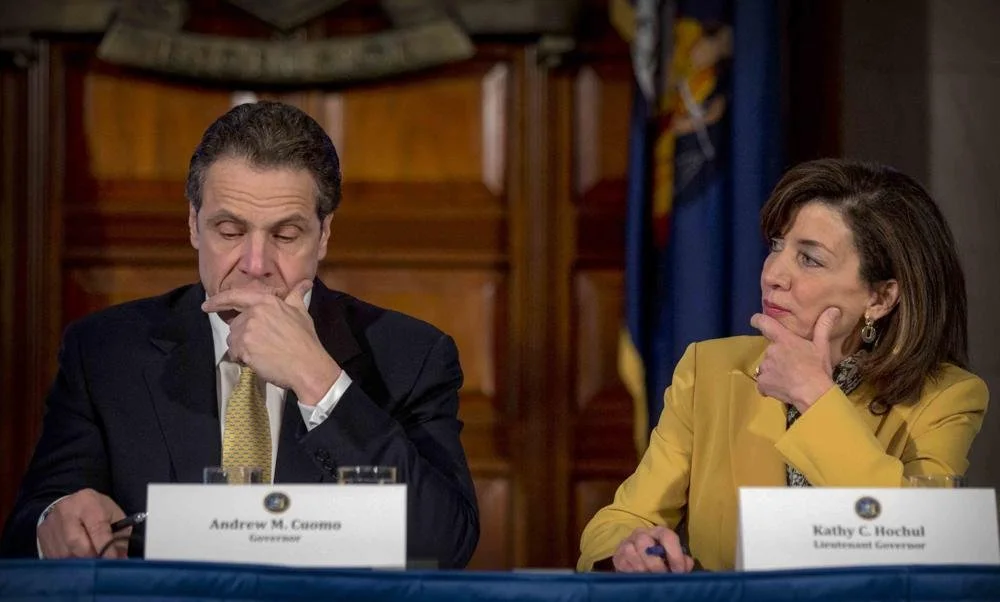Trump backers give to Hochul
Contributors who spent millions on former president also gave $867,000 to governor Hochul
Billionaire backers who donated millions of dollars to former President Donald J. Trump also gave hundreds of thousands of dollars to Gov. Kathy Hochul, a Democrat, according to an analysis constructed by LittleSis, a grassroots watchdog network.
The contributors, who included not just billionaires, but real estate moguls and entrepreneurs, spent $867,000 on Hochul ahead of the November general election. The governor became the state’s Democratic nominee last month. Hochul has amassed a record $21.9 million in campaign donations since announcing her intent to run for the governorship. She took the reins from former Gov. Andrew M. Cuomo, who left office in August after a state attorney general’s report found he was responsible for sexual misconduct or other inappropriate behavior involving 11 women. The donors also spent $3.2 million on Trump between his campaign committee, Donald J Trump for President, and his joint fundraising committees, Trump Victory and Trump Make America Great Again Committee.
Multiple highly influential real estate donors gave roughly or exactly $69,700, the legal maximum, to Hochul’s campaign. They include Steven Roth, chairman of Vornado Realty Trust, which owns a vast number of commercial buildings in Manhattan; Arnold Gumowitz, a mega-broker; developers Joe Cayre and Lloyd Goldman; and billionaire investor Alexander Rovt.
Another real estate billionaire, John A. Catsimatidis, wrote a $25,000 check to the campaign. His wife, Margo Catsimatidis, gave an additional $25,000.
Gumowitz spent $504,630 on the former president, the group’s largest individual amount. Cayre and his wife, Trina Cayre, separately donated $631,781 to Trump. Donations from Catsimatidis and his wife, Margo Catsimatidis, totaled $887,000.
Another donor, billionaire investor Nelson Peltz, who gave $25,000 to Hochul and $85,800 to Trump, later expressed regret over supporting the former president in the aftermath of the Jan. 6 insurrection.
Peltz spoke out a day after the event in an interview with CNBC, explaining he voted for Trump in the 2020 election and said he was “sorry I did that.”
“I supported many of his policies,” Peltz said. “Which I still think were good ones, trade efforts, economic policies. I think they’re good for our country. But so much good was undone yesterday with what we all saw.”
The Hochul campaign has taken in roughly $4.6 million in real estate money, according to The Real Deal, an industry publication.
Hochul’s predecessor had also been known to take large real estate donations; a trend that progressive advocates hoped would change when she became governor.
Jess Wisneski, co-executive director of Citizen Action of New York, another grassroots organization, contends New Yorkers may see a lack of advocacy from Hochul on tenant protections as a result of the donations, even though candidates for office can’t control who gives money to their campaigns.
“It felt like Kathy Hochul’s housing policy in the executive budget was basically a replica of what Cuomo has done in the past,” Wisneski said. “It’s just nothing in comparison to the dramatic needs of New Yorkers and the housing crisis, at all different levels. Everything from tenant protections, like Good Cause Eviction, but also the building of affordable units.”
The state’s eviction moratorium ended Jan. 15. Hochul touted the policy as being one of the longest-running in the country.
In addition, she’s asked the federal government for additional funding for the Emergency Rental Assistance Program.
A Hochul spokesperson referred the Times Union to the governor’s campaign. Her campaign declined to comment.
It’s not uncommon for the overly wealthy to donate to all candidates in a race and across party lines where their interests are concerned.
The small donor public financing system, set to go into effect for the state Legislature in 2024 and all statewide races in 2026, will match the donations of New Yorkers with taxpayer money.
Candidates would still be able to accept private donations, though there will be new limits, with the aim of limiting the influence of big-money donors.

